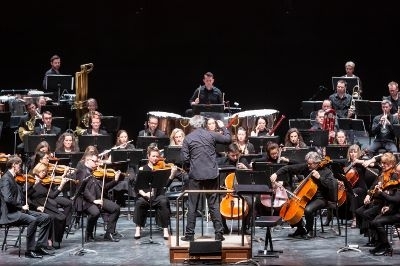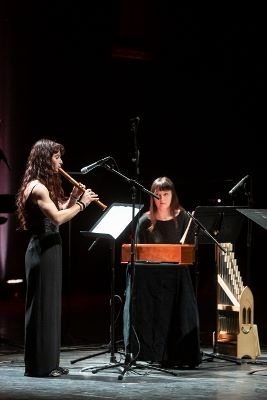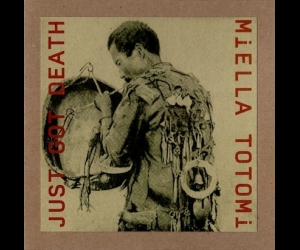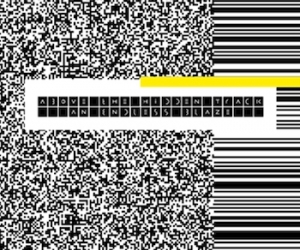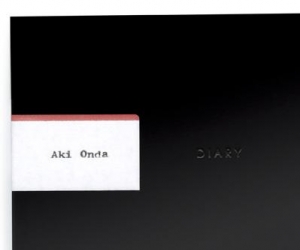The twenty-ninth edition of the annual Winnipeg New Music Festival (WNMF) loosely explored the concept of home and, conversely, what it means to be an outsider—or even an exile—in one’s own land. Seven nightly programs, spearheaded by the WNMF’s cocurators Daniel Raiskin and Harry Stafylakis, whipsawed between works born of bleakest despair and ones that were joyous combustions of synergistic energies.
The opening bill, Fire and Blood, led by Raiskin, featured the first offering by eminent U.S. composer Michael Daugherty, one of two distinguished guest composers participating this year. His violin concerto Fire and Blood (2017), inspired by Mexican painter Diego Rivera’s Detroit Industry Murals and Frida Kahlo’s Motor City paintings, was brilliantly performed by Juno Award-winning violinist Alexandre Da Costa. Daugherty’s dazzling work was a roiling cauldron of competing forces—American industrialism versus the folkloric beauty of Mexico, the latter signalled by touches of sentimental mariachi music. The soloist’s extended cadenza during the opening Volcano movement—performed in counterpoint with marimba and maracas that hissed like a rattlesnake—was a particular highlight. The concert also included the Manitoba premiere of Stafylakis’s Sun Exhaling Light (2017), written in response to the rise of mass shootings in the U.S., including the Pulse nightclub massacre in Orlando, Florida, in June 2016. No stranger to gritty subjects, the New York City-based composer displayed his penchant for crafting extreme contrasts of range, texture, and timbre with an effective, plaintive oboe solo line floating over lugubrious sonic depths of low brass and strings. Distinguished guest composer Sarah Kirkland Snider’s Hiraeth, the program’s final piece, was an elegiac tribute to her beloved late father, its memory-soaked ethos heightened by Mark DeChiazza’s images of the composer’s childhood home in North Carolina.
The second program, led by WSO associate conductor Julian Pellicano, featured the Canadian premiere of the 2019 chamber version of Snider’s concert-length Penelope (created in 2010), performed by American mezzo-soprano and singer-songwriter Shara Nova (of My Brightest Diamond) and an ensemble of seven players, with a brief appearance by Raiskin’s Amsterdam-based jazz-drummer son, Ilia Rayskin (so spelt). The work converts Homer’s Odyssey to a modern story of a couple attempting to reunite after growing apart, delving into what it means to come home. The unique soundworld for the cinematic piece unfolds as an ambient blending of pop, rock, classical, and jazz elements, and was most effective during more textural moments, such as the section in which Nova’s smoky, darkly hewn vocals juxtaposed with intimate violin pizzicato.
The festival’s annual Orchestral Voices of the Future program featured world premieres of works by seven emerging composers who also participated in the fourth annual Composer’s Institute, which includes mentorship. workshops, coaching sessions, and open rehearsals. This year’s standout was Henry From, who, at age fifteen, is not only the youngest winner of the CMC Prairie Region Emerging Composer Competition but also the youngest artist to have their music performed on the WNMF stage. His winning orchestral tone poem, Isle of Pic (2019), inspired by a Group of Seven painting, was infused with lush layers of orchestral colours and effects.
This year’s Choral Night explored the idea of old made new, in an eclectic, relatively lengthy program comprising ten works, including the world premiere of Terri Hron’s Of All the Flowers (2019) for choir, recorder, historical keyboards, and electronics. It was preceded by a performance of Guillaume de Machaut’s De toutes flours—which, though it inspired Hron’s piece, still felt jarring in the contemporary program—as well as a crowd-pleasing trio of Georgian a cappella works. The program’s shining star was Toronto-based, Haida/Cree singer-songwriter Kristi Lane Sinclair, whose stunning Woman (2015) was written to honour missing and murdered Indigenous women of Canada. Sinclair’s tapestry of voices, including sustained tones juxtaposed with pulsing rhythms, created a powerfully moving performance.
The Art of Dialogue program delved into the idea of home as seen through the eyes of the disenfranchised. Four potent works—performed by as many stellar soloists and led by Raiskin—could not have differed more from each other. WSO principal flutist Jan Kocman shone in the Canadian premiere of Gabriela Lena Frank’s Illapa: Tone Poem for Flute & Orchestra (2004). Dinuk Wijeratne’s Clarinet Concerto (2018) for solo clarinet, strings, and piano, with virtuoso Kinan Azmeh as soloist, and infused with Middle Eastern rhythms, entranced the audience.
But the evening belonged to composer Jared Miller, who introduced Shattered Night (2019) from the stage as his “personal emotional response” to the eightieth anniversary of Kristallnacht, the 1938 Nazi pogrom against Jews, dedicating the performance to his maternal grandmother’s family, who perished in Nazi concentration camps. Performed by American pianist Sara Davis Buechne (its co-commissioner with the WSO), the piece ricochets between extremes of violent contrasts: clanging brake drums, crashing cymbals, and pounding piano tone-clusters against ephemeral wind chimes, bowed crotales, glassy string harmonics, and seagull-esque glissandi. The piece culminates in ten tinkling music boxes playing the Jewish “Shema,” which is then sonically slaughtered by walls of sound. A final, woozy utterance of the “Shema” leitmotiv, played sotto voce by duo clarinets, evoked the spirits of the dead and left the entire audience hushed in reverent silence.
Stafylakis, a self-described metal head, continued to push the boundaries of what contemporary new music is by programming renowned Armenian jazz pianist-composer Tigran Hamasyan and his trio. Hamasyan performed his Road Song (2013) with an orchestra at the Art of Dialogue concert and in his own dedicated program the following evening.
The final concert presented music by Michael Daugherty, including his monumental Metropolis Symphony, which he composed between 1988 and 1993 to mark the fiftieth anniversary of Superman’s first appearance, in Action Comics #1 in 1938. The vibrant orchestration was as colourful as a comic book, including the orchestra’s full complement of bells and whistles. The opening movement, Lex, featured violinist Karl Stobbe’s awe-inspiring, unflinching delivery of fiery perpetuum mobile triplet figures, propelled by the sparring forces of the orchestra, including the shrieks and shrills of four police whistles from around the stage’s circumference. In the third movement, Mxyzptlk, duelling flutists, evoking the eponymous impish trickster, enthralled us with intricate, tightly knit runs and trills.
The well-paced program also included Icelandic composer Daniel Bjarnason’s All Sounds to Silence Come (2007), and the Canadian premieres of two works dedicated to Raiskin, who commissioned and premiered the pieces with the Staatsorchester Rheinische Philharmonie while serving as its music director: Russian-American composer Lera Auerbach’s Eterniday (Homage to W. A. Mozart) (2010) and Benjamin Staern’s Wave Movements (2011). These two introspective offerings balanced the otherwise bold program and capped a particularly diverse week that swung wildly between shadows and light.
